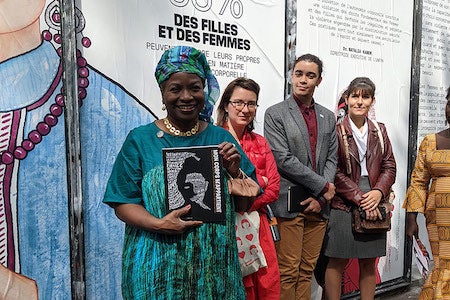News
Bodily autonomy becomes a global rallying cry at Paris Forum on gender equality
- 02 July 2021
News
UNITED NATIONS, New York/PARIS, France – “Our clarion call is this: There can be no gender equality without bodily autonomy and sexual and reproductive health and rights, and no bodily autonomy and sexual and reproductive health and rights without full gender equality,” UNFPA Executive Director Dr. Natalia Kanem said today in Paris, at the Generation Equality Forum on advancing gender equality.
The call was echoed by heads of state, lawmakers, feminist activists and young people in Paris and around the world, during a key session of the Forum: the launch of the Action Coalition on Bodily Autonomy and Sexual and Reproductive Health and Rights. It is one of six action coalitions, each with a specific mandate to advance the welfare, rights and equality of women and girls. UNFPA is co-leading this action coalition, alongside governments, civil society, and private sector partners from around the world.
“UNFPA looks forward to joining hands with you to take meaningful, deliberate actions that will result in real change on the ground, where it counts,” Dr. Kanem said.
Voices of youth
Prominent among those participating in the Action Coalition were youth organizations, including grassroots activists and young feminist leaders whose voices have run the loudest through the halls of the Forum and over the virtual connections that enabled worldwide participation.
Many young advocates spoke forcefully about the importance of scientifically accurate, age-appropriate, human-rights-based information about sexual and reproductive health.“We had no sexuality education at all, comprehensive or otherwise,” said a youth advocate in India in a video transmission. “Many transgender people are taking hormones without any supervision at all,” said another young person.

Comprehensive sexuality education is a critical enabler and protector of bodily autonomy. UNFPA committed to ramping up delivery of quality sexual and reproductive health information and services, one of several key commitments that UNFPA announced at the Forum this week.
UNFPA also committed to increase reproductive rights literacy to empower women and girls to make autonomous decisions about their bodies, and to increase support to feminist and women-led organizations working to promote and protect sexual and reproductive health and rights and bodily autonomy.
Persistence in resistance
This Forum must unleash “a challenge to resistance against women's access to their rights,” 24-year-old Oumou Salif Touré, a feminist leader from Mali, told UNFPA.
Ms. Touré came to the Forum with Paris-based NGO Equipop, a partner of UNFPA. Her own experience shows how knowledge of one’s rights can ignite the movement for change.
“When I saw that I did not benefit from the same rights or advantages as boys my age, I felt a certain revolt, and a fierce desire to change this state of affairs by becoming a feminist activist,” she said.
She, and many other young feminist, have calling for real change. And today, at the highest levels, they are being heard.